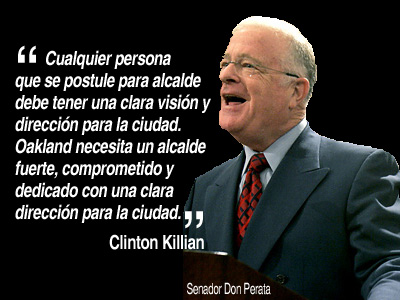
Oakland’s deficit is quickly becoming a huge concern for the city. It's now estimated at $70 million and growing. The deficit has been driven larger because the two primary sources of tax revenue, property and sales taxes, are hit the hardest by this economic downturn. There's less property selling
and at lower values. As a result, transfer and property taxes are lower. Oakland’s already small retail base, hit hard by the economic slowdown means less sales taxes.The City has tried several things to close the deficit, like to furlough employees and to close City buildings. About 43% of the budget goes to pay off set fees such as government and voter mandated expenses and bond obligations. A large chunk of discretionary funds goes to pay primarily policing, fire, and administrative expenses. That leaves a small amount -- about 15% -- available for discretionary spending.
Simply shutting down City services for a day or two is not a long term solution. The cost cutting must be done in a much more systematic way.
For example, everyone making over a $100,000 a year receives a 5% five percent pay reduction. So instead of targeting all the workers with pay cuts and City shutdowns, the top should be trimmed and overhead expenses should be reduced from the top down. It is time that the top levels of government feel the economic pain we are all suffering.
Look at the model set by Stanford university. In order to close its budget gap, the president took a voluntary pay cut of 7% and asked all of the top 10% earners to do the same. Just about everyone complied and the budget deficit was resolved without punishing students or workers. There were no layoffs and no drastic student fee hikes.
Oakland should follow that example. Since the mayor’s office has shown no desire to review administrative spending, recall the lack of impact by the $250,000 Bobb study, the City Council must take the lead. The Council could first start by reducing its own spending, and each elected official's office by 10%. Then it could require all department heads and top city administrators to take a 5% pay reduction.
The current condition cries out for better political leadership. The mayoral election of 2010 should attract many qualified candidates. Several persons eager to run for mayor, such as John Russo, Jane Brunner, Ignacio de le Fuente and others, quickly declined when former state senator Don Perata announced he would run. A few, such as Councilwoman Jean Quan, has been very active city wide in broadening her base to run for mayor.
Even though Mr. Perata is a formidable opponent, there are numerous cracks in his seemingly "invincible" armor. In 2008, the School Board and Council at-large candidates that he supported were defeated handily. Mr. Perata has enjoyed very strong support in Oakland over the years, but last year, voters showed a strong streak of independence and desire for accountability in their leadership.
The diversity of Oakland will help any new candidate in the race. Ethnic groups make up about 75% of the voters. Liberal/progressive voters make up about 30%, conservatives about 20%, and the moderate middle the rest. The growing LGBT voting block has been gathering strength and is politically active. Mr. Perata’s lack of diverse supporters and inner circle will hinder his campaign. A diverse coalition can elect a non-Perata Mayor.
Whoever runs for Mayor must have a clear vision and direction for the City. Oakland needs a strong, committed, and dedicated Mayor with a clear direction for the city. The new Mayor must be unafraid to take on the huge challenges of the city and appreciate our unique diversity. Solutions must be found for our high crime rate, new jobs and economic opportunities have to be created, and quality city services need to be provided. All the tools for the solutions are right here in Oakland. And now, it just becomes a question of who can put together the best recipe for success. The 2010 Mayor race will provide the answer to that question.
Clinton Killian is an attorney in downtown Oakland, an Oakland resident, a former Oakland Planning Commissioner. He can be reached at: (510) 625-8823 or email: clintonkillian@yahoo.com.
